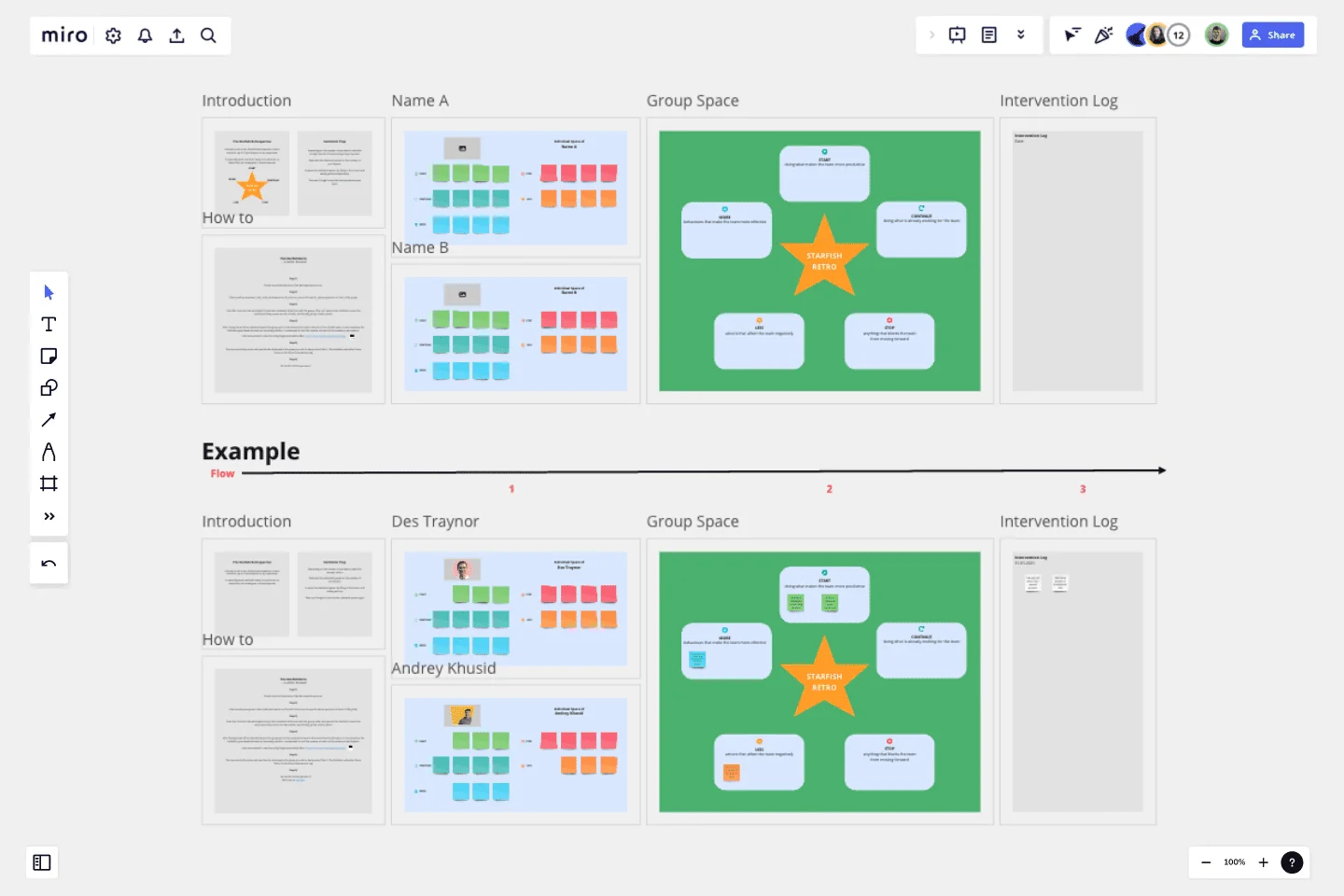Starfish Retrospective
The Starfish Retrospective is ideal for up to 10 participants and works very well with newly formed teams or teams that have experienced a tough time.
A Retrospective, in general, is an important meeting the fosters continuous and sustainable development of a team's processes.This Retrospective method helps the team to create a commitment. They don't just complain, but directly define measures that they themselves can refer to and implement.The Starfish Retrospective therefore focuses on action formulated items in the areas of:
Start doing what makes the team more productive
More behaviours that make the team more effective
Less actions that affect the team negatively
Stop anything that blocks the team from moving forward
Continue doing what is already working for the team
This template was created by Netzwerkknoten. You also can see how it works in this video.
Get started with this template right now.
Retrospective - Christmas Edition
Works best for:
Agile Methodology, Retrospectives, Meetings
The Retrospective Christmas Edition template offers a festive and themed approach to retrospectives, perfect for the holiday season. It provides elements for reflecting on the year's achievements, sharing gratitude, and setting intentions for the upcoming year. This template enables teams to celebrate successes, foster camaraderie, and align on goals amidst the holiday spirit. By promoting a joyful and reflective atmosphere, the Retrospective - Christmas Edition empowers teams to strengthen relationships, recharge spirits, and start the new year with renewed energy and focus effectively.
Lean Project Charter
Works best for:
Agile
The Lean Project Charter template provides a streamlined approach to defining project objectives, scope, and success criteria. It emphasizes clarity, brevity, and alignment with Lean principles, enabling teams to kickstart projects with focus and purpose. This template empowers teams to set clear goals, establish shared understanding, and align stakeholders, driving efficiency and effectiveness in project delivery. By promoting transparency and accountability, the Lean Project Charter sets the foundation for successful project execution and continuous improvement.
Lean Coffee by Michael de la Maza
Works best for:
Agile Methodology
Lean Coffee is a collaborative meeting format that encourages open dialogue and self-organization. Participants suggest discussion topics, vote on them, and engage in time-boxed conversations. This template provides a structured framework for facilitating Lean Coffee sessions, enabling teams to address issues, share knowledge, and make decisions collectively. By fostering inclusivity and autonomy, Lean Coffee empowers teams to drive meaningful discussions, build consensus, and drive continuous improvement.
Gantt Chart Template
Works best for:
Project Management, Mapping, Roadmaps
Simplicity, clarity, and power — that’s what make Gantt charts such a popular choice for organizing and displaying a project plan. Built upon a horizontal bar that represents the project progress over time, these charts break down projects by task, allowing the whole team to see the task status, who it’s assigned to, and how long it will take to complete. Gantt charts are also easily shareable among team members and stakeholders, making them great tools for collaboration.
App Development Canvas Template
Works best for:
Market Research, Product Management, User Experience
Ever noticed that building a successful app requires lots of players and moving parts? If you’re a project manager, you definitely have. Lucky for you, an app development canvas will let you own and optimize the entire process. It features 18 boxes, each one focusing on a key aspect of app development, giving you a big-picture view. That way you can fine-tune processes and get ahead of potential problems along the way—resulting in a smoother path and a better, tighter product.
Breakout Group Template
Works best for:
Education, Team Meetings, Workshops
Breakout groups provide an excellent opportunity for teammates to have candid conversations and connect on a more intimate level than is possible during a broader meeting. When you’re in a large group setting, it can be difficult for people to feel safe or comfortable speaking up. In a smaller group, participants can feel safer sharing their ideas. Since the group is more intimate, teams are empowered to participate rather than observe.
